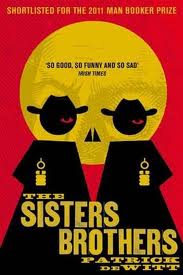 I thought before I even attempt to tackle any of this year’s Man Booker shortlisted novels I’d take a look at some of last year’s nominees. Last year the judges were criticised for looking for ‘readable’ novels that people would enjoy. This year the judging panel were looking to avoid pandering to the masses, selecting what appear to be challenging books, outside of the mainstream. I’m curious to see the difference between the lists since I’m sitting on the fence in this debate. As an ordinary reader, what I’m in the mood to read changes every day. I might want something light, next time something more profound. I don’t have to make a permanent ruling on which is ‘better’. And while a dichotomy does exist, it isn’t clear where the line is; readability doesn’t automatically make a book terrible and quality is not absolutely implied by its opposite.
I thought before I even attempt to tackle any of this year’s Man Booker shortlisted novels I’d take a look at some of last year’s nominees. Last year the judges were criticised for looking for ‘readable’ novels that people would enjoy. This year the judging panel were looking to avoid pandering to the masses, selecting what appear to be challenging books, outside of the mainstream. I’m curious to see the difference between the lists since I’m sitting on the fence in this debate. As an ordinary reader, what I’m in the mood to read changes every day. I might want something light, next time something more profound. I don’t have to make a permanent ruling on which is ‘better’. And while a dichotomy does exist, it isn’t clear where the line is; readability doesn’t automatically make a book terrible and quality is not absolutely implied by its opposite.
Patrick deWitt’s Booker prize shortlisted second novel is the tale of two famous gunslingers, brothers Charlie and Eli Sisters, hired by their boss to kill a prospector named Hermann Kermit Warm, set against the backdrop of the California Gold Rush. I love this period in history in fiction (Deadwood is brilliant). It’s grimy and raw, and what with the virtual lawlessness and the lure of striking it rich, the Wild West can make a criminal out of almost anyone. It’s fascinating to witness humanity on the brink of civilisation and DeWitt’s portrait of the Sisters brothers and the people they meet on their journey is no exception.
The Sisters Brothers is rough yet tender, funny, and quirky. The first half has the brothers travelling to California, meeting odd characters along the way. The story meanders as new acquaintances share their strange stories. The second half sees Eli and Charlie in San Francisco with their intended target, alleged thief Hermann Warm. It’s a dark journey but deWitt manages to find the absurd humour in each situation. At one point on the road Charlie starts to chuckle, then recounts the story, to Eli, of the day their father died. It’s a brutal tale and yet part of the memory has made Charlie laugh. The Sisters Brothers is filled with violence, the pursuit of power and riches, and the madness that inevitably accompanies that pursuit. The brothers’ lives are bleak but deWitt’s handling of it put a smile on my face as often as it made me want to turn away in disgust or sadness.
We meet the brothers at a time when Eli no longer wants the life of a killer. Instead he yearns for love and security. Eli is naive enough to think every woman who shows him kindness is his soul mate, even in the midst of tracking down a man they’ve been paid to kill (creating several lovely tragicomic moments). He is sensitive, neurotic and uncertain. Charlie is a simpler character, seemingly happy with his profession, predisposed to cold violence and hard drinking, difficult yet often charming. The brothers are complicated characters but you are never allowed to forget they are still vicious, ruthless guns for hire.
Patrick deWitt uses a delightfully straightforward manner of writing that suits his narrator, Eli Sisters, perfectly: ‘I could hear him exchanging words in the road with a group of men, and I listened to make sure he was not in danger, and he was not–the men asked him his name and he told them and they left him alone.’ This ingenuous quality, partnered with his disdain for his profession, often gives Eli’s descriptions, of anything from a party of whores, to food, or injuries, a hideous, garish quality that conveys the setting beautifully.
DeWitt has managed to inject humour and pathos into a tale of curses, insanity and murder, creating a terrific and wonderfully balanced novel, full of memorable characters.
